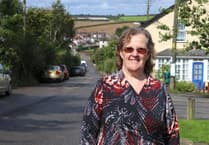HOPES that a safe cycle route from Crediton to Exeter is nearer to a reality have been boosted after Devon County Council was awarded funding to support active travel.
The County Council has been awarded just over £580,000 to enable and encourage more people to walk and cycle.
The grant from the Active Travel Capability Fund is part of a national £32.9 million investment to help accelerate walking and cycling schemes across the country and make roads safer for everyone.
Although the government funding cannot be used for the construction of infrastructure, it can go towards the design of walking and cycling routes which could be included in future bids to the Active Travel Fund.
Initial designs are to be drawn up for strategic walking and cycling routes in Exeter, Barnstaple and Newton Abbot, as well as a potential new route between Crediton and Exeter.
Proposals for new walking and cycling networks for several market and coastal towns will be developed, as well as further work on proposals for low traffic neighbourhood trials.
The allocation will also fund:
• expansion of the county’s programme of adult cycle confidence sessions;
• development of Local Cycling and Walking Infrastructure Plans which sets out a strategic approach for long term improvements;
• monitoring previous active travel schemes and expanding public engagement.
Councillor Stuart Hughes, Cabinet Member for Highway Management, said: “We’re really pleased to receive this grant. This will help fund our long-term ambitions to expand our walking and cycling network across the county.
“Not only will it enable us to continue to develop future plans it will also allow us to continue to promote active travel events and programmes such as our adult cycle confidence sessions.”
Active Travel Minister Jesse Norman said: “Leaving the car, and walking and cycling instead, is an easy way to get fit, save money and reduce your carbon footprint.
“Better designed schemes, which take into account the views of local people will help deliver improvements that have widespread local support. Skills training and local community engagement will help local authorities to make active travel an attractive choice for getting around.”
National Active Travel Commissioner Chris Boardman said: “If we want to enable hundreds of thousands more people to walk, wheel and cycle for everyday trips then we need to deliver high-quality schemes that make it feel easy, fun and safe.
“Of course, ensuring the right technical skills are in place at a local level is vital but so is engagement. Survey after survey has shown strong community support for making space for active travel but it’s vital that people get strong input into helping to decide what is the right solution for their area.”
The Active Travel Capability Fund will also support local councils to train and retain engineers and planners to design, develop and consult on high-quality active travel schemes.
As well as supporting “green” jobs it aims to ensure that local authorities collaborate effectively with local communities.
BONIFACE TRAIL
Mid Devon District Councillor Graeme Barnell gave an update on the Boniface Trail to the December meeting of Newton St Cyres Parish Council.
He told the parish council about what was discussed at the recent A377 Action Group meeting.
He explained that the consultant’s report promised at the end of the summer required amendment, but at present there was no funding available. A funding bid had been submitted, the results of which would be known in January.
He explained that Devon County Council favours a route along “quiet lanes” as this would be considerably cheaper.
He said it might be necessary to include some road restrictions limiting vehicles to make this viable. At the same time, it was suggested that the route identified by the Boniface Trail Association might be deliverable in phases over a period of time.
Active Travel England’s objective is for 50 per cent of trips in England’s towns and cities to be walked, wheeled or cycled by 2030, in line with the Exeter Transport Strategy.
Cycling UK has estimated that if people cycled short journeys, they would save an average of £126 per year in fuel costs alone and would burn hundreds of extra calories each week.


.jpg?width=209&height=140&crop=209:145,smart&quality=75)


Comments
This article has no comments yet. Be the first to leave a comment.